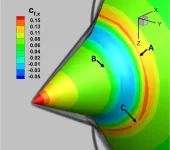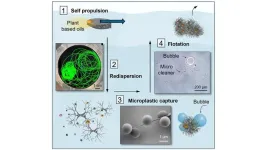(Press-News.org) San Diego—March 26, 2025– In a manuscript published today in the American Journal of Psychiatry titled Psychiatric Genetics in Clinical Practice: Essential Knowledge for Mental Health Professionals, authors provide updated guidelines on what mental health professionals should know about the latest advances in genetics and how genetics can inform clinical psychiatric practice.
Key findings highlight the importance of understanding the genetic architecture of psychiatric disorders, the potential applications of genetic information in risk assessment, diagnosis, treatment selection, and patient education, as well as the ethical and social considerations surrounding the use of genetic data. The paper was developed by the International Society for Psychiatric Genetics Education Committee, which identified the subject matter as a priority topic.
“The complex interplay between genes and environment is a central theme in contemporary psychiatric genetics and one that has profound implications for how we conceptualize and address mental health conditions,” said Aaron D. Besterman, MD, Clinical Investigator at Rady Children’s Institute for Genomic Medicine and first author of the study. “By adopting a more holistic and integrative perspective that considers the full range of biological, psychological and social determinants of mental health, we can move toward a more personalized and effective model of care.” Besterman chairs the Society’s Education Committee and also has academic appointments at the University of California San Diego.
The paper notes that the field of psychiatric genetics has undergone a remarkable transformation in recent years, driven by rapid advances in genomic technologies and large-scale international collaborative research efforts, making it critically important for mental health clinicians to stay informed about the latest findings and their clinical implications through ongoing education, collaboration with genetics professionals and effective communication strategies.
The manuscript provides an overview of several key areas in psychiatric genetics, all illuminated by brief case studies, that are important for mental health clinicians to understand, including heritability of genetic disorders, the role of common and rare genetic variants, epigenetics and gene expression, gene-environment interplay, pharmacogenomics, genetic counseling, and ethical and social issues.
The authors note that knowing how to interpret and communicate genetic risk, understanding the interplay of genetic and environmental factors, considering genetic factors in medication selection, and navigating the ethical implications of psychiatric genetics are all part of the expanding role of the mental health clinician.
Equally important, the paper states, is acknowledging that psychiatric disorders are complex, multifactorial conditions that cannot be reduced to simple genetic determinism.
“It is crucial to emphasize that genetic information is just one piece of the puzzle,” said Besterman. “Highlighting the complex interaction between genetic, social, psychological, and neurobiological factors, as well as the potential for symptoms to respond to various treatments, can help counter the misconception of ‘genetics as destiny.’”
Article link: https://doi.org/10.1176/appi.ajp.20240295
END
Study finds knowledge of genetics and genomic medicine crucial for mental health providers to deliver informed, personalized care
Findings highlight importance of understanding the genetic underpinnings of psychiatric disorders
2025-03-26
ELSE PRESS RELEASES FROM THIS DATE:
Hypersonic simulation in 3D exposes new disturbances
2025-03-26
At hypersonic speeds, complexities occur when the gases interact with the surface of the vehicle such as boundary layers and shock waves. Researchers in the Department of Aerospace Engineering in The Grainger College of Engineering, University of Illinois Urbana-Champaign were able to observe new disturbances in simulations conducted for the first time in 3D.
Fully 3D simulations require a great deal of processing power, making the work expensive to compute. Two things made it possible for Deborah Levin and her Ph.D. student Irmak Taylan Karpuzcu to conduct the research: Time on Frontera, the National Science Foundation-funded leadership-class computer system at the Texas ...
Your neighborhood may affect your risk of dementia
2025-03-26
EMBARGOED FOR RELEASE UNTIL 4:00 P.M. ET, WEDNESDAY, MARCH 26, 2025
MINNEAPOLIS — People living in more disadvantaged neighborhoods may be more likely to develop dementia than people living in neighborhoods with fewer disadvantages, according to a study published on March 26, 2025, online in Neurology®, the medical journal of the American Academy of Neurology. The study does not prove that neighborhood factors cause dementia; it only shows an association.
Neighborhood status was determined by factors such as income, employment, education and disability.
“Our findings show that the community in which you live influences your risk of developing dementia,” ...
Early signs of heart problems linked to smaller brain volumes
2025-03-26
EMBARGOED FOR RELEASE UNTIL 4:00 P.M. ET, WEDNESDAY, MARCH 26, 2025
MINNEAPOLIS — People who have early signs of heart problems may also have changes in brain health that can be early signs of dementia, such as loss of brain volume, according to a meta-analysis published on March 26, 2025, online in Neurology®, the medical journal of the American Academy of Neurology. The meta-analysis does not prove that early heart problems cause loss of brain cells; it only shows an association.
“This review shows that better ...
Research finds potential “molecular mimics” behind COVID-induced autoimmune disease
2025-03-26
COVID infection has been linked to higher risk of autoimmune disorders, including rheumatoid arthritis and type 1 diabetes. But why the virus might cause the body’s immune system to go haywire remains unknown, making it difficult to develop therapies to avoid autoimmunity. One hypothesis is that viral “molecular mimics” that resemble the body’s own proteins trigger an immune response against the virus—and healthy tissues get caught in the crossfire.
Now, with advanced data analysis and machine learning, scientists have identified a set of COVID-derived ...
Pennington Biomedical researchers identify neurons in brain that regulate energy levels and body temperature
2025-03-26
FOR IMMEDIATE RELEASE
March 26, 2025
BATON ROUGE – Scientists at Pennington Biomedical Research Center have gained greater clarity in the brain regions and neurons that control metabolism, body temperature and energy use. Featured in the February edition of the journal Metabolism, Dr. Heike Münzberg-Gruening and a team of researchers discovered which chemicals influence the signals that control how much energy the body uses. In “Leptin Receptor Neurons in the dorsomedial hypothalamus require distinct neuronal subsets for thermogenesis and weight loss,” researchers laid out the pathways, chemicals, neurons ...
Cleaning microplastics
2025-03-26
In a new paper, researchers at North Carolina State University show proof of concept for a system that, in a single cycle, actively removes microplastics from water.
The findings, described in the journal Advanced Functional Materials, hold the potential for advances in cleansing oceans and other bodies of water of tiny plastics that may harm human health and the environment.
“The idea behind this work is: Can we make the cleaning materials in the form of soft particles that self-disperse in water, capture microplastics as they sink, and then return to the surface with the captured microplastic contaminants?” said Orlin Velev, the S. Frank and Doris Culberson Distinguished ...
MD Anderson names Jeffrey E. Lee, M.D., Chief Medical Executive
2025-03-26
HOUSTON ― The University of Texas MD Anderson Cancer Center today announced that Jeffrey E. Lee, M.D., an internationally regarded leader in the field of oncology, has been appointed chief medical executive (CME) effective April 1.
Prior to his appointment, Lee served as CME ad interim, demonstrating strength as a leader committed to advancing the institution’s efforts in research, patient care, prevention and education. Assuming the role of CME is the culmination of Lee’s 34-year tenure at the institution, where he has made substantial contributions in the field ...
Sensor technology uses nature’s blueprint and machinery to monitor metabolism in body
2025-03-26
Life’s essential functions are powered by a set of compounds called metabolites, which are involved in every natural process including producing energy, regulating cell activity and keeping the body’s systems in balance. Tracking these molecules offers a window into the onset and status of many diseases, overall health, response to treatment and the intricate workings of biological systems.
However, today’s metabolite sensing methods fall short. Most rely on resource-intensive lab tests that give only brief snapshots from isolated samples. The few sensors that can track metabolites continuously are largely limited to detecting blood sugar.
An interdisciplinary ...
Chan Zuckerberg Initiative announces new biohub to develop breakthrough imaging technologies to observe cells in action
2025-03-26
REDWOOD CITY, Calif. (March 26, 2025) — The Chan Zuckerberg Initiative (CZI) announced a new grand challenge to develop groundbreaking imaging technologies to transform how scientists observe, measure and understand living cells and organisms. CZI’s two powerhouse institutes, CZ Biohub San Francisco and CZ Institute for Advanced Biological Imaging, will leverage their complementary expertise to form a new Biohub unmatched in the field of life science imaging research. They will combine their teams at a new science campus in Redwood City, Calif., adjacent to CZI ...
Encryption breakthrough lays groundwork for privacy-preserving AI models
2025-03-26
In an era where data privacy concerns loom large, a new approach in artificial intelligence (AI) could reshape how sensitive information is processed.
Researchers Austin Ebel and Karthik Garimella, Ph.D students, and Assistant Professor of Electrical and Computer Engineering Brandon Reagen have introduced Orion, a novel framework that brings fully homomorphic encryption (FHE) to deep learning — allowing AI models to practically and efficiently operate directly on encrypted data without needing to decrypt it first.
The implications of this advancement, ...
LAST 30 PRESS RELEASES:
One strategy to block both drug-resistant bacteria and influenza: new broad-spectrum infection prevention approach validated
Survey: 3 in 4 skip physical therapy homework, stunting progress
College students who spend hours on social media are more likely to be lonely – national US study
Evidence behind intermittent fasting for weight loss fails to match hype
How AI tools like DeepSeek are transforming emotional and mental health care of Chinese youth
Study finds link between sugary drinks and anxiety in young people
Scientists show how to predict world’s deadly scorpion hotspots
ASU researchers to lead AAAS panel on water insecurity in the United States
ASU professor Anne Stone to present at AAAS Conference in Phoenix on ancient origins of modern disease
Proposals for exploring viruses and skin as the next experimental quantum frontiers share US$30,000 science award
ASU researchers showcase scalable tech solutions for older adults living alone with cognitive decline at AAAS 2026
Scientists identify smooth regional trends in fruit fly survival strategies
Antipathy toward snakes? Your parents likely talked you into that at an early age
Sylvester Cancer Tip Sheet for Feb. 2026
Online exposure to medical misinformation concentrated among older adults
Telehealth improves access to genetic services for adult survivors of childhood cancers
Outdated mortality benchmarks risk missing early signs of famine and delay recognizing mass starvation
Newly discovered bacterium converts carbon dioxide into chemicals using electricity
Flipping and reversing mini-proteins could improve disease treatment
Scientists reveal major hidden source of atmospheric nitrogen pollution in fragile lake basin
Biochar emerges as a powerful tool for soil carbon neutrality and climate mitigation
Tiny cell messengers show big promise for safer protein and gene delivery
AMS releases statement regarding the decision to rescind EPA’s 2009 Endangerment Finding
Parents’ alcohol and drug use influences their children’s consumption, research shows
Modular assembly of chiral nitrogen-bridged rings achieved by palladium-catalyzed diastereoselective and enantioselective cascade cyclization reactions
Promoting civic engagement
AMS Science Preview: Hurricane slowdown, school snow days
Deforestation in the Amazon raises the surface temperature by 3 °C during the dry season
Model more accurately maps the impact of frost on corn crops
How did humans develop sharp vision? Lab-grown retinas show likely answer
[Press-News.org] Study finds knowledge of genetics and genomic medicine crucial for mental health providers to deliver informed, personalized careFindings highlight importance of understanding the genetic underpinnings of psychiatric disorders



